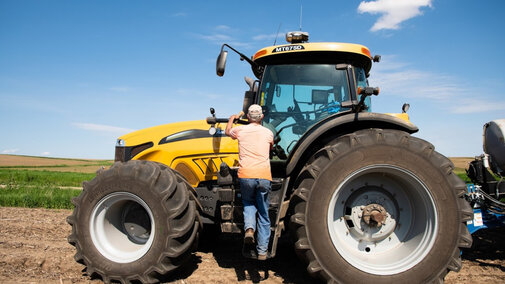Recently, a small utility tractor rollover fatality in southeast Nebraska was a wake-up call to the dangers involved in operating older tractors without rollover protection. The danger exists on farms and acreages, no matter what your age and experience. It is so tragic to the family members, the first responders and the rural community. It’s an image that is really hard to forget. Today, older tractors that do not have rollover protection are a major safety issue in agriculture settings.
Beginning in 1986, American tractor manufacturers began voluntarily adding ROPS (Roll Over Protection Structure) on all farm tractors sold in the United States over 20 horsepower. Before that, ROPS was an option and many farmers due to economics didn’t choose to add them. For information on tractor safety, see this resource.
It only takes one second for a tractor to tip over backwards when trying to pull out a heavy object or stump hitched or chained too high on a tractor. No one can act that fast to avoid a tractor accident in a tip-over sidewise or backwards incident.
Because of their high center of gravity, tractors are more susceptible to rolling or turning over. Always hitch loads at the drawbar, never higher. Use front weights to increase tractor stability.
DID YOU KNOW (according to the The Great Plains Center for Agricultural Health at the University of Iowa):
- Tractor overturns are the leading cause of fatal injuries on U.S. farms, resulting in an average of about 130 deaths each year.
- One in 10 operators overturns a tractor in his or her lifetime.
- 80% of deaths caused by tractor overturns involve experienced operators.
- One in seven farmers involved in tractor overturns is permanently disabled.
- Seven of 10 farms will go out of business within five years following a tractor-related fatality.
Many tractors manufactured before 1986 are still widely used on farms and unlikely to have been retrofitted with ROPS. And often youth on farms are operating them putting them at risk. It could be moving hay bales, hauling irrigation pipe or many other farm tasks.
Extension educators in Nebraska are teaching teens to be safe with tractors every year. Randy Saner, a University of Nebraska Extension educator, reports that a common cause of agricultural-related injuries and deaths in Nebraska is overturned tractors and ATVs. He emphasized that extension classes are designed to train students how to avoid these incidents, as well as many other hazards on the farm and ranch. The classes are held annually throughout May and June. For more information, visit the CropWatch tractor safety page.

